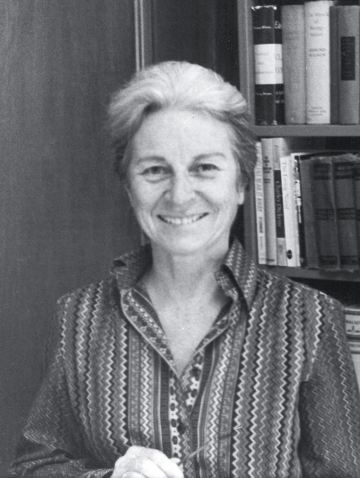Doris Holmes Eyges, lecturer emerita of English, died on Feb. 16 at the Brookhaven retirement community, in Lexington, Mass., where she had lived since 2007. She was 95.
Doris was a class dean at Wellesley from 1969 to 1977 and an affectionately admired member of the English faculty from 1972 until her retirement in 1988. A poet and memoirist of note, Doris came to Wellesley from teaching at Milton Academy and before that had been a central member of a community of poets in Boston and Cambridge who gathered around her first husband, John Holmes, a distinguished poet and teacher of poets at Tufts University. As a part of that community, Doris was a friend, peer, and hostess to many young writers, participating in workshops and exchanging work and criticism with Anne Sexton, Maxine Kumin, and others, including Marcia Stubbs, a dear friend who became a noted expert in the teaching of expository writing, the author of best-selling textbooks in the field, and, later, the first director of Wellesley’s own writing program.
In the class deans’ office, Doris provided crucial and judicious leadership during the turmoil of the late 1960s at Wellesley, always offering wise counsel. As her colleague Shirley Quinn recalls, Doris survived “with tact and diplomacy” sit-ins and demonstrations in the class deans’ offices and elsewhere—and the “sometimes near violent atmosphere” of the times.
In 1972, she became a full-time adjunct faculty member in the English department, where I came to know her and where she taught very successfully a wide range of courses in creative and expository writing and the writing of critical essays, and in literature. For many years, she taught, often in multiple sections, a popular course in American Women Writers of the Short Story, one of the first courses at Wellesley to recognize women’s writing as a distinct subject of study.
Doris made a very good thing of her adjunct status, speaking her mind readily in collegial conversation, while remaining comfortably on the margins of departmental affairs. But she was a central figure to her students; and nobody who knew her could fail to recognize or value the strength of her mind, her elegance of speech and person, her kindness, the warmth of her voice, and her laughter.
At a gathering for Doris when she retired in 1988, she was toasted first by Robert Garis for the fineness of her language, the relaxed but alert clarity and force with which she routinely spoke. And then second and wittily, by Arthur Gold for her good looks and good legs—a remark that Arthur counted on the habits of the time and his own close relationship with Doris to make acceptable.
Doris clearly enjoyed and welcomed both of those tributes, but the second made an awkward segue for me, because I wanted to say in my own toast that I had always treasured in Doris the qualities that reminded me so strongly of my mother. As I knew from many of our conversations and from some of her wonderful written recollections of her childhood, Doris, like my mother, had come from a cultured and once prosperous family that had lost its money in the Depression. Also like my mother, Doris was an exceptionally intelligent and strong-minded person, whose passage through both personal traumas and the ordinary gauntlet of challenges faced by women of her generation, produced in her a special combination of intellectual strength, of self-sacrificing generosity, and, occasionally, of self-questioning reserve. None of which prevented her—indeed, all of which aided her—in being a wonderful teacher, colleague, mentor, and friend.
By Timothy Peltason, professor of English





We ask that those who engage in Wellesley magazine's online community act with honesty, integrity, and respect. (Remember the honor code, alums?) We reserve the right to remove comments by impersonators or comments that are not civil and relevant to the subject at hand. By posting here, you are permitting Wellesley magazine to edit and republish your comment in all media. Please remember that all posts are public.